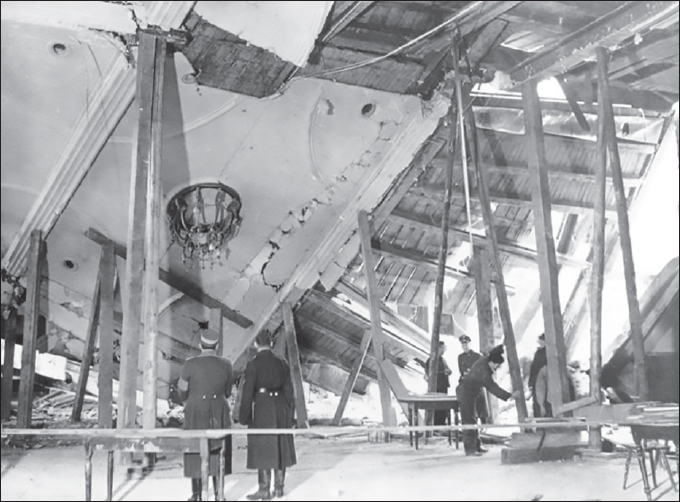
15
Corey tried not to make noise, but it felt like his lungs were having a boxing match in his chest. He lay still on a carpeted floor, grimacing. For a moment he didn’t know where he was. If he moved even a muscle, he knew he’d groan. And if he groaned, someone would hear him.
So he lay still.
The shock to the system seemed to get worse with each time hop, not better. When did this get easier? Shouldn’t it get easier?
After a few minutes, he slowly sat up in the living room of his Upper West Side home. Light filtered in from the street, and he could see an outline of the old clock, just now striking 1:00 a.m.
Just as he expected, it didn’t make a sound.
Being home, taking a break from Nazi Germany, should have felt great. But Corey wanted to get in and get out, fast and quiet. He just needed information, that’s all. It wouldn’t take much to find out what happened on November 8, 1939, at that beer hall in Munich, Germany.
He removed the phone from his pocket and powered it on. Immediately it lit up with notifications, a chorus of ping! ping! ping! that might wake up his whole family. He quickly shut off the sound. His charger was still where he’d left it, so he plugged in his phone and navigated straight to the photos he’s taken before he’d time-traveled back to the present.
They were still there, every one. Every photo he had sneaked after following Leila and Georg back into the Bürgerbräukeller. The entire sprawling, empty restaurant. A close-up of the inside of the hollowed-out pillar. The wiring. The clock timer. The almost invisible rectangular seam when the whole thing was sealed up.
Wi-Fi and cell service may have been decades away in 1939 Germany, but since Corey’s phone still powered on, he could take photos and save them to the phone’s drive.
Right now, they served as a record of a perfect crime that failed. Something in the wiring, the placement, the technology—something had to give a hint what went wrong.
His fingers navigated to search.
 GEORG ELSER BOMBING
GEORG ELSER BOMBING
Corey scrolled through all the entries, reading as many as he could, soaking up the history. Elser was the oldest of six, great at drawing and math, but his father drank and his parents divorced. As a young adult he worked in furniture, woodworking, clocks, carpentry, armaments. He made housings for wall and table clocks. He got a job in a shipping company where he had access to fuses and detonators.
It all made total sense. Elser’s personal life seemed like a mixed bag, but his professional life was like . . . clockwork.
Corey skipped lightly over all that stuff. Sure enough, every online biography of Elser included information about November 8, 1939. Plenty of it, in great detail. What went right and what went wrong. Corey pored over every word.
The bomb had worked. The problem had to do with timing.
On that day, Hitler was deep into his plans for war with France. He wanted to cancel the speech at the Bürgerbräukeller completely. It came very close to not happening at all. But the tradition was long and Hitler loved a big, adoring crowd. So at the last minute he changed his mind. After he decided yes, he would do it, his staff told him the weather wouldn’t be suitable for flying back to Berlin the next day. So if he really wanted to give the speech, he would have to take the train that night. And the train would have to leave at 9:30 p.m.
Which meant Hitler would not start at 8:30 as planned. He’d start a half hour early, at 8:00 p.m. sharp. And he’d speak for only an hour.
That night, unlike his usual rambling self, he pretty much stuck to schedule. He started around 8:00 and ended at 9:07.
Which was thirteen minutes before Georg Elser had set the timer to detonate the bomb, at 9:20.
Corey felt the blood draining from his head. That was how Hitler escaped.
He’d have to show this research to Leila, Georg, Maria, and Clara. He saved the articles to his Files folder, hoping they would be there when he went to 1939. The photos would help, too, so he included what he could find. Like images of the bomb mechanism and the restaurant before and after the explosion. A photo of the destruction gave him goose bumps. This was real. And dangerous.

He was concentrating so hard he didn’t notice someone entering the room.
“Want some olives?”
At the sound of Zenobia’s voice, Corey nearly dropped his phone. She was standing in the doorway to the kitchen, picking with her fingers from with a plastic container of brown olives from the Mani Market. “You scared me,” he said. “What are you doing awake at 1 a.m. eating olives?”
Zenobia shrugged. “I had a craving. Why are you wearing those clothes?” With a sly grin, she sat on the arm of the couch. “Are you guys doing Newsies? Or is this the way you dress when you use a dating app for toddlers?”
Corey quickly swiped up to make the photos disappear. “I thought you said you weren’t going to make fun of me anymore. After I saved you.”
“Just joking. Jeez, you are so serious.” She cocked her head curiously. “Hey, are you okay? You don’t look so good.”
“That’s because I’m looking at you eating olives with your fingers.”
“Ha ha. There are plenty more.” She held out the open container. “They taste even better marinated in finger sweat.”
“Sounds delicious, but I have to go.”
Zenobia let out a laugh. “Go where? It’s one in the morning.”
From farther inside the apartment, Corey heard a groan and a thump. Zenobia glanced back over her shoulder. “Mom?”
Corey heard a yawn, and it wasn’t his mom’s. A familiar voice called out, “Will you please stop making so much noi—”
Zenobia leaped up from the sofa, sending olives all over the living room.
Corey held tight to his phone. But the blood was rushing from his head.
Standing the doorway, staring at him like some twisted 3D-mirroring app, was Corey Fletcher.
“This wasn’t supposed to happen,” Corey murmured.
“I know,” said the other Corey.
“How did I mess this one up? Every time I time hop back to where I started, I just exchange places with myself. There’s always one Corey. This never happened before.”
The other Corey shrugged. “Time travel can be sloppy, I guess. Maybe your powers are evolving.” He laughed. “My powers.”
“Our powers.”
Corey had been curious about what it would be like to talk to himself. It felt terrible. It felt like some small creature had crawled inside him and was twanging all his nerves, head to toe, like a guitar.
They both glanced toward Zenobia, who was now on the floor, unconscious. “I didn’t know people actually fainted in real life,” the other Corey remarked.
“Would you take care of her?” Corey asked. “I—I have to go.”
The other Corey nodded. He picked up the backpack from the floor and handed it over. “I know.”
Corey quickly unplugged his phone and pocketed it. Then he reached inside for the chandelier shard, which was practically too hot to touch. But he forced his hand around it, allowing the heat to soothe his nerves while it singed his skin.
The last thing he saw before blacking out was his own back, dressed in pajamas, leaning over his sister.
And when his eyes opened again, he saw exactly what he’d seen the moment before he left Munich.
A toilet.